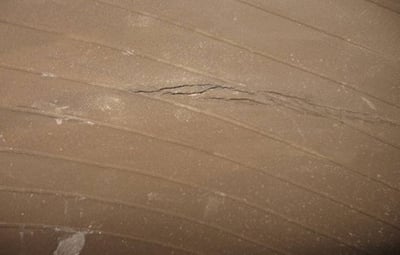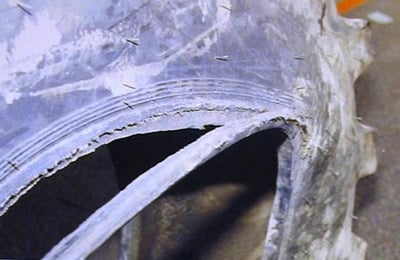As you surely know, it's best not to have too high a tyre pressure as that would cause soil compaction on your land and hinder your crops' root development.

The higher the tyre pressure, the more your tractor will sink into soft terrain, until the soil resistance is enough to compensate for the weight of your machine.
So surely the logical choice is to make sure your tyres are always under-inflated, as this will prevent soil compaction and help maintain your productivity?
We would actually advise strongly against it...
If you're using a normal agricultural tyre that has not been designed for such use, such as a low-cost tyre, a budget tyre, or a very cheap tyre from a well-known brand (cost-saving manufacture), this lack of pressure could end up costing you dearly, and here's why:
On soft ground, high pressures aggravate compaction, form ruts in which crops cannot grow, and increase rolling resistance. The penalty for high pressures is therefore decreased mechanical efficiency and crop yields.
Both your tyres and the soil are deformable, meaning that the tyre is squashed and the soil is compacted until the two opposing forces are equal and balance each other out.
By reducing tyre pressure, you will increase its footprint on the soil and thus reduce compaction. However, each tyre has its own unique characteristics, and if the manufacturer gives you a minimum pressure that you cannot go under, it's because the tyre is not designed for it.
If you were looking to save money when it came to replacing your tyres, and you decided to go for a low-cost or budget agricultural tyre, the casing and the material used to make its sidewalls will not be designed to undergo excessive deformation, and will even be considered as fragile areas that are not supposed to ever be in contact with the ground.
A tyre inflated much lower than the recommended pressure will suffer internal damage that is not always visible from the outside, but that may manifest even after the pressure has been corrected.
When the tyres compress against the ground, the ends of the sidewalls that protrude beyond the tread come into contact with the ground and are subjected to the same impact and damage as the tread, but without the tread's protective thickness and structure.
A rock, a root or a branch could cut through and suddenly puncture the tyre and immobilise your vehicle, with all the turnkey costs that would entail.
And when driving on roads at higher speeds, under-inflation increases the tyre's internal temperature and may, over long distances, cause a spontaneous puncture if the casing is weakened.

The tyre is out of order
An under-inflated tyre does not maintain its initial shape. Whilst driving, it will flatten into a shape characteristic of excessive deformation.
This under-inflation leads to irreversible damage to the casing, which is the tyre's main structural element.
If the butyl rubber breaks (see photo), your tyre will be instantly out of commission.

Fracture at the carcass fold
Frequent under-inflation causes progressive wear and abrasion to the casing reinforcement and ply on the rim flange due to excessive sidewall movement and flex.
The tyre will fail at the casing ply (see photo), at which point you will have no option but to replace it.
On the road, your tyres heat up and the rubber softens, reducing their life span by 25% on abrasive terrain.
Under-inflated tyres "bounce" off the ground, leading to abnormal wear of the shoulders and lugs (where only one of the two is worn).
Similarly, if you notice more wear on the rear of the lugs, it's a sign that you're driving on under-inflated tyres too often or that you're carrying an excessive load, which has the same effect on your tyres as under-inflation.
Handling and stability when cornering will be impacted. This is because the tyre undergoes deformation that is not compensated for by the pressure, meaning it will likely compress excessively and this will affect stability when turning, especially if your vehicle is loaded.
If your vehicle is overloaded, there is a much greater risk of an accident with under-inflated tyres.
The contact surface area between an agricultural tyre and the road will be greater than normal, as will rolling resistance, resulting in fuel loss of up to 5% of your overall consumption, and even more if you're on the road for a long time.
To best preserve your soil, you should use a low-pressure tyre that has been specifically designed for field use and will not be damaged when carrying out such work.
Agricultural tyre technology has made some tremendous advances in recent years, with new reinforced radial structures.
These are tyres with IF (Increased Flexion) or VF (Very High Flexion) casing, which are made using steel structures and offer stronger and more flexible sidewalls.
The figures speak for themselves: an IF tyre can bear up to 20% more load than a standard tyre, and a VF tyre can carry up to a 40% heavier load at equal speeds and distances.
Here's an advantage not to be sniffed at: no more issues linked to incorrect tyre pressure. With VF tyres, there's no longer any need to modify your tyre pressure when moving from one type of terrain to another, or for significant shifts in speed. This upgrade allows ever-busier farmers to save time and have a more comfortable drive, without having to worry whether their tyre pressure is right for the road, deep soil or chalky ground.
VF casing can go down to 0.8 bar whereas standard agricultural tyres cannot go below 1.2 bar.
Soil compaction is one of the main concerns of cereal farmers and agricultural contractors.
In terms of agronomy and soil preservation, VF tyres can do no wrong. Thanks to their lower pressure:
Lower tyre pressure, larger soil footprint, higher load index – all the proof you need that VF agricultural tyres can boost your productivity.
Test results and user feedback have shown that this technology makes it possible to treat more than one hectare in a single day – a yield gain that goes hand in hand with your lower fuel consumption.
To learn more and boost your farm's profits, Bridgestone Agriculture is offering you a free, detailed eBook that explains the essential role your agricultural tyres play in your productivity.
The most people who have read this article have also read the following articles, which are listed below in order of popularity:
This information is intended only to make you aware of the technical and functional aspects of agricultural tires and their use. It does not allow you to make a judgment or a definitive conclusion on a given problem. Only your agricultural tire expert is able to make a technical assessment and take a final decision, case by case.

BRIDGESTONE EUROPE NV/SA
AG Department
Leonardo Da Vincilaan 1
1930 Zaventem | Belgium
Our regional office:
Athena Drive, Tachbrook Park
Warwick CV34 6UX
United Kingdom